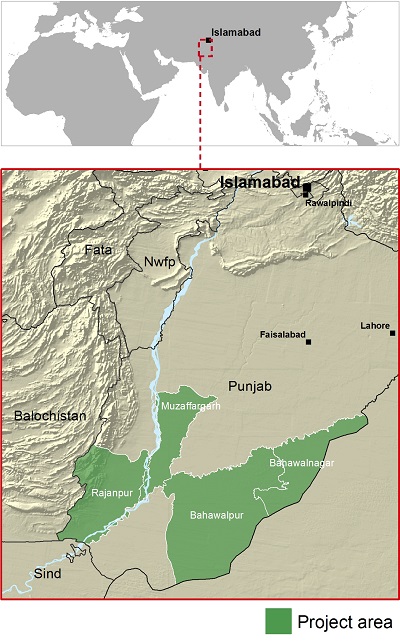Southern Punjab Poverty Alleviation Project
IFAD Asset Request Portlet
Agrégateur de contenus
Southern Punjab Poverty Alleviation Project
The Southern Punjab Poverty Alleviation Project (SPPAP) will be implemented in the districts of Bahawalpur, Bahawalnagar, Muzafargarh and Rajanpur. The total rural population of these districts is estimated to be 8.6 million or just over 1.2 million households.
The project objective is to increase the incomes of the target population by enhancing their employment potential and boosting agricultural productivity and production.
The SPPAP will benefite landless casual labourers, smallholder farmers and woman-headed households. It is expected that about 80,000 poor rural households from four districts will benefit directly from the project.
The project will assist the Government of Punjab in achieving its economic growth and poverty alleviation objectives.
One of the innovations of the SPPAP is the use of the poverty scorecard as an effective targeting instrument.

Rapports du Président
Rapports du Président
Rapports de conception du projet
Rapports de conception du projet
Documents de supervision et d'appui à l'exécution
Documents de supervision et d'appui à l'exécution
Supervision mission, February 2018
Année: 2018
Supervision mission, March 2017
Année: 2017
Supervision mission, September - October 2015
Année: 2015
Supevision Mission, February 2014
Année: 2014
Étude de l'impact environnemental et social
Cadre de gestion environnementale et sociale
Rapport sur l'examen à mi-parcours
Rapport sur l'examen à mi-parcours
Mid-term Review Report, January 2015
Année: 2015
Cadre d’action de réinstallation
Condensé de rapport d'achèvement de projet
Études spéciales
Liste de projets
Audit et états financiers
Audit et états financiers
2023-Ministry of Economic Affairs-AUDIT_REPORT
Année: 2023
2022-Ministry of Economic Affairs-AUDIT_REPORT
Année: 2022
2021-Ministry of Economic Affairs-AUDIT_REPORT
Année: 2021
2020-Ministry of Economic Affairs-AUDIT_REPORT
Année: 2020